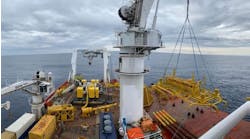The age demographics of the oil industry are disturbing. There is a substantial population of people in their late 40s and early 50s, and there is a fair group of neophytes, but there are very few people with ages between the two groups.
From small drilling contractors to the super majors, the problem is the same. Sadly, the problem is not geographically isolated. The expansion of exploration and development activity is international and affects manpower in every location where drilling is taking place. In fact, the shortage of personnel is already a crisis in some areas. As one contractor put it, "Everybody, but everybody, is desperately short of people."
Day rates for rigs, equipment, and personnel have escalated yet even with higher oil and gas prices, and with companies paying higher wages, the industry is unable to attract new employees or to encourage current employees to remain.
Picking up the slack
Consultants and service companies are picking up the slack for some technical areas. For example, companies such as Q&B Serviços Ltda. in Rio de Janeiro have capitalized on the shortage of workers in the industry and found a niche market - providing people. The company provides tool rental, specific services, and skilled workers for drilling and production on well sites offshore Brazil.
After six years in a rapidly expanding business, Director Miguel Queiroz sees continued growth over the next few years. He predicts stabilization will not occur in this service industry until 2007 or 2008.
Similarly, the Gulf of Mexico is seeing drilling activity expansion, and companies like Q&B are working to keep up the supply of trained workers. Global Project Consultants of Houston is providing engineering supervision, procurement, cost control, and inspection services on the Canyon Express project, among others. President Mike Cooley says his staff, about half of whom are engineers, are very much in demand. The company is setting up shop in Brazil in anticipation of an increased need for skilled labor in the major offshore basins.
The plan is to provide some American workers, but there will also be Brazilians on the staff. As Cooley explains, "there's plenty of talent there." He foresees a lot of projects that start in the United States and move into the international arena, where the labor force will need to be supplied.
While there are more consulting companies springing up and more individuals striking out on their own to provide consulting services, there is still a lack of resources. Many consultants are finding that they are in such demand that they are stretching themselves very thin in order to meet their obligations.
Requests for their services continue to pour in. However, consultants can only fulfill some of the manpower needs. Oil companies need to find a way internally to address the shortages of skilled and experienced people.
Lack of loyalty?
Part of the problem is rooted in the lack of loyalty between companies and employees, a situation that often cannot be remedied simply by throwing money and stock options at employees. Employees know that employment can end high salaries abruptly.
Loyalty is like credibility; it's hard to build up. And a lot of it has been destroyed. Much of today's distrust stems from the severe cuts in personnel in the last industry downturn.
Bob Palmer, Chairman, President, and CEO of Rowan Companies, explains: "If you want an employee to be loyal to you, you need to be loyal to the employee. It's that simple."
Hindsight has shown that cutting personnel to satisfy the analysts for short-term gain was misguided. The industry got caught up in the idea of saving money in the short term, which amounted to losing much more in the long term. The amount of money it would have taken to keep people was insignificant, compared to the costs those companies are incurring now in the search for qualified professional personnel.
Rowan, among a small number of companies, avoided the pitfall of personnel shortages, according to Palmer, by investing in its employees strongly over the years and adhering to its corporate policy of hiring only entry-level employees, promoting from within, and rewarding competence and loyalty.
Sometimes, this kind of investment has meant softness in equity share prices during slow times. "Rowan will take those financial hits because the company believes that in the longer term it benefits Rowan and its shareholders to hold the company together." Palmer notes, "After all, money is easier to find than people."
Different perspective
Very few companies share Rowan's personnel position. But there are companies that have made significant efforts to preserve their work force during the slumps in order to be ready for business when the industry cycles up.
Global Marine, an international driller like Rowan, did lay off some employees in the last downturn, but management contends that the reduction in force was based on performance. In order to avoid losing critical skilled offshore workers, Global Marine implemented a "Bump-back Program." Briefly, an employee was asked to move to a position subordinate to his or her current position. If the employee wasn't reinstated to the original position after six months, then his or her wage dropped to that of the subordinate position.
In implementing this program, Global Marine ensured employees were made aware of a potential wage cut and were given a timeline. More significantly, employees knew they would not lose their jobs.
"Our people knew that we were committed to them and that when the market turned around, they were going to have the opportunity to get back into their prior positions," explained Jon Marshall, Executive Vice President and COO of Global Marine. "If this had turned into a protracted downturn, we wanted to give them sufficient time to plan their personal finances."
To the firm's offshore workers, such as Tool Pusher Richard Kennedy, this attitude made a major difference. In Kennedy's view, "if Global was willing to go that mile and spend those costs on their employees, I felt I was obligated, as well, to be patient and persevere."
According to Kennedy, Global Marine's employees viewed the Bump-back Program as a commitment, noting that fellow employees are still talking today about how good the program was. Global Marine's commitment "gave the employees who did go on the Bump-back Program even more incentive to stay with the company," Kennedy said.
If the industry is truly in the beginning stages of the problem, the shortage will get worse before it gets better. Although companies have recognized that they have damaged themselves during the downsizing process, some have done more than provide stopgap fixes to the problem. Those companies should be able to retain the skilled professionals they will need. But a number of management officials admit they are not in that category.


